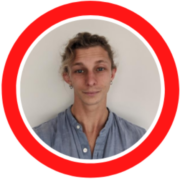ArtMoMa and TUD are happy to have you on board, Henry!
Henry Carey-Morgan will join the Technische Universität Dresden in Germany next October. As an ArtMoMa Early Stage Researcher, he will work on the application of motor proteins and microtubules as molecular explorers for 3 years, while participating in international events, training sessions, and secondments. This is the occasion to learn more about Henry, and find out why he chose to be part of the network:
Tell us about your background!
I’m 24 years old, from the UK, and studied an integrated Master’s MPhys (Hons) in Physics and Philosophy at the University of Manchester. I researched antibacterial graphene films for my Masters Project, where I gained an interest in organic/inorganic interfaces and artificial replication of biological systems. I also developed a philosophical intrigue in fictional characters, emotion and collective intention. I enjoy sailing, scuba diving, boxing and reading history, fiction, psychology – and a bit of everything really!
Why did you want to be a part of ArtMoMa?
I believe many of the most interesting areas of research are conducted at the interdisciplinary boundaries between the labels human beings superimpose upon Nature. Artificial molecular machinery is one such place; where the segmented socially constructed ideas of physics, biology and chemistry start to break down. Furthermore, it is a chance to contribute to brilliant, forward-thinking, and potentially far-reaching technological breakthroughs that may truly change the way we perform medicine, see ourselves and see the world.
What are your expectations of living and working in your host city?
For the work I cannot wait to be a part of TU Dresden, not only due to its reputation as an international center for biophysics – its partnership with the Max Planck Institute and its position as one of Germany’s Excellence Universities – with remarkable facilities. Also, I was amazed by Dresden’s massive and brilliant collaborative atmosphere that was so impressed upon me during my interview there. I look forward to learning more not only through my field of study but as part of the Biopolis.
I am also incredibly excited to live in a new country and a city with such complex history, beautiful reconstruction, and the (so I’ve heard) great nightlife in the Neustadt.
What do you think will be your main challenge for you in the next three years?
I think with any frontier research the main challenge is the creativity that comes with having to find one’s own answers and decide where you take your research. For me, the greatest challenge is both having an idea of the direction you are heading in and what your narrative is, whilst also accepting and realising when your results call for a different plan.




